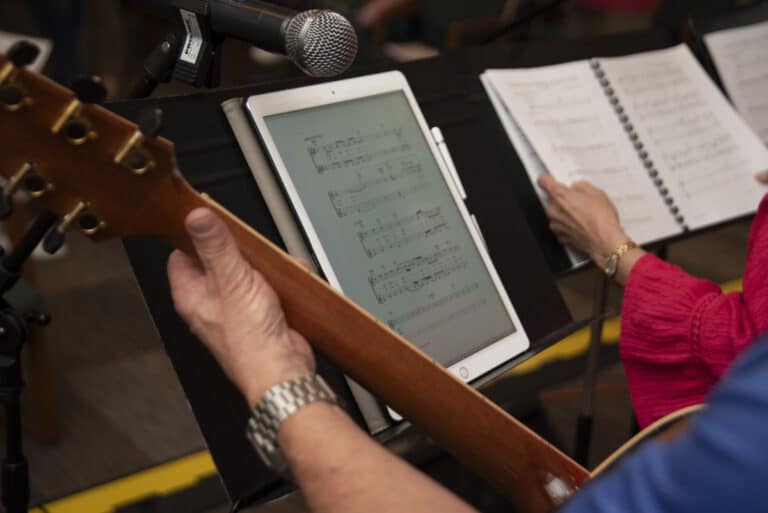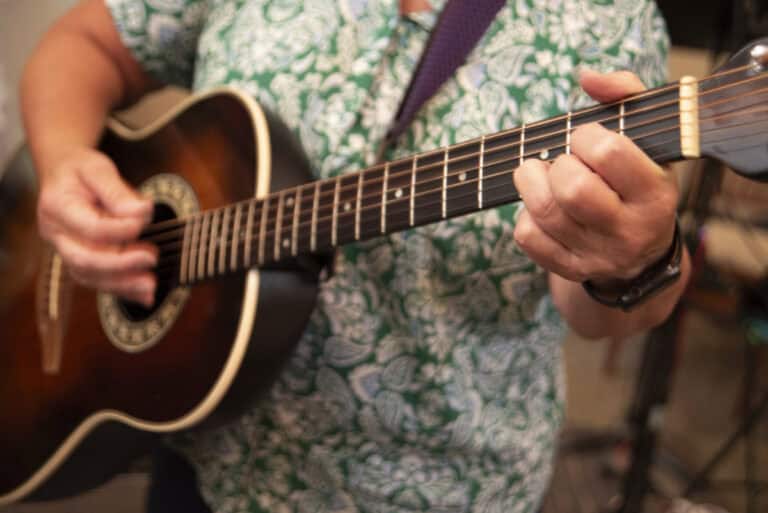This article is the first in a series designed to support the essential functions of music directors who have ensembles within their music programs. While there are many professionally paid music directors in parishes across the country, we know there are MANY parishes with fewer financial resources that engage part-time or volunteer music directors. These directors often find themselves in leadership positions without adequate training and no real affordable options for learning.
Because we know the practical work of music directors forms and shapes the overall music program, this series will provide a comprehensive collection of resources — including both written and video content — specifically aimed at music directors.
Since the fall of 2022, Catholic Liturgical Ensemble Formation (CLEF) has provided free weekly educational resources on many different elements of ensemble music ministry. Through these CLEF Life resources, experts from across the country have shared their wisdom regarding wide-ranging topics covering music, liturgy, spirituality, singing, and specific instruments. That effort continues with this series for music directors and other upcoming series that will be interspersed to provide relevant and meaningful educational resources to assist those who regularly share their musical gifts and talents with their faith communities.
The music director series will cover four essential functions of music directors: leadership and management, which form the infrastructure of music ministry, plus music direction and non-musical tasks, which form the execution of music ministry.
Leadership
Leadership includes how the entire program operates, the way in which everyone interacts, and the framework for how decision-making occurs. Think of leadership as the operating system by which a laptop computer works. When we open the laptop, we expect everything to operate in a certain way. Leadership in music ministry provides the guidelines by which everything in the ministry operates. We will explore elements of different types of leadership, including that of the highly effective servant leadership model.
Management
Management is the full representation of the ministry’s leadership expressed through the music director within their daily/weekly interaction with members. Think about elements that affect human relationships — factors such as communication, trust, and respect, just to name a few. How people interact, deal with conflict, prefer to be lead, and offer feedback greatly affects the work of music ministry.
In addition, given that all musicians maintain some sense of ego and/or struggle with issues around self-esteem, the interaction can quickly become challenging. Management explores all the ways in which the music director can create a healthy and loving environment through the choices they make surrounding their interaction with others.
Music direction
This is the “nuts and bolts” of the curriculum, the practical how-to content covering every aspect of being a music director. In fact, almost every element in music direction could begin with “how to,” including topics such as:
- How to direct hands-free and how to direct while playing an instrument
- How to achieve good vocal production from the ensemble
- How to better work with instrumentalists
- How to run a general rehearsal and the rehearsal just before the liturgy begins
Over time, this series will present a comprehensive list of topics surrounding the musical direction within a music program.
Non-musical tasks
Non-musical tasks will explore exactly what it says – all of the tasks of a music director that only indirectly relate to music. We’ll look at topics such as music budgets, recruiting new members, working with youth, planning music for liturgy and copyright law, just to name a few. These behind-the-scenes tasks are easily forgotten or ignored, yet they are the elements that make music programs highly successful.
The demands of the music director role
Being a singer or instrumentalist in an ensemble takes time, talent, and commitment. Musicians may spend several hours a week preparing the music for an upcoming liturgy. Being a music director, however, demands a significantly greater level of skill and ability.
Music directors must know their own part well if they’re playing an instrument while leading, but they must also know well the parts of all ensemble members. They must be able to listen to and communicate with singers and other instrumentalists while executing their own part. They must lead musical elements like dynamics and tempo changes, all while watching what’s happening in the liturgy so that the music is appropriately timed. Directors must be good middle-managers, communicators, listeners, motivators, spiritual leaders, conflict resolvers, and on-the-spot decision-makers. Phew! That’s a lot. The good news? These are all skills that can be learned over time.
We know that music directors are pivotal in producing great music for worship, and we know that many are seeking improvement. Our CLEF Life series for music directors aims to provide the resources to assist music directors every step of the way in their learning. Leading a music program that includes ensembles and choirs is one good measure of a healthy community — but it can be a daunting challenge. If you are a seasoned leader, these resources will likely bring a smile as they affirm what you do, and they might even offer some good ideas that you haven’t previously considered. If you are a newer director, these resources will serve as building blocks for the many skills necessary to effectively lead music ministry in your community.
Watch for this content series for music directors and more on the essential functions of music directors to begin unfolding. May your journey deeper into music ministry leadership be filled with great growth and much reward! And if you’re not a music director, stick with us during this content series, as there will be many elements that can benefit liturgical musicians at all levels.
Written by Steve Petrunak, a founding board member of CLEF and director of music at St. Blase Catholic Church in Sterling Heights, Michigan. He has worked in music ministry for more than 40 years and is the co-author of “Managing Music Ministry: Beyond Notes and Chords.”
Copyright © 2024 Catholic Liturgical Ensemble Formation
Looking for more resources? Search our full online library of CLEF Life resources, or sign up for CLEF Life email updates to receive the latest resource in your inbox once a week.



